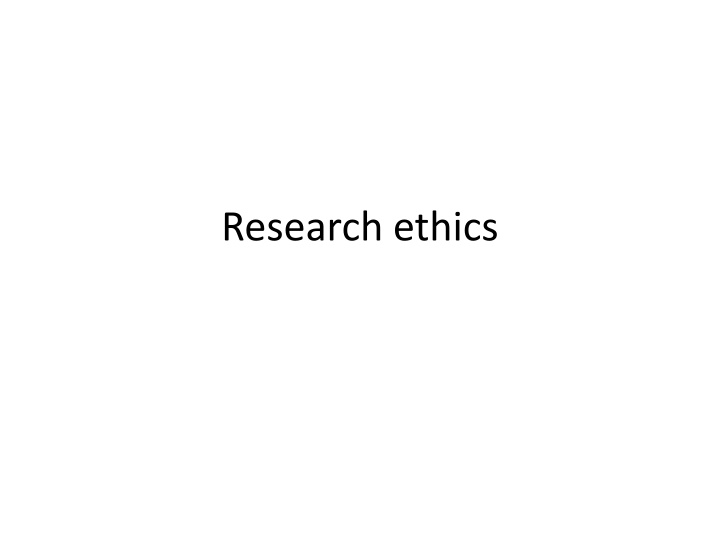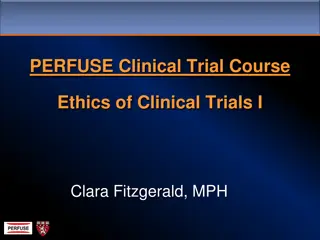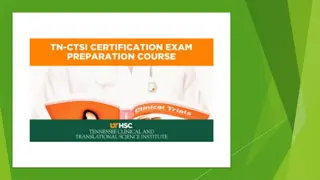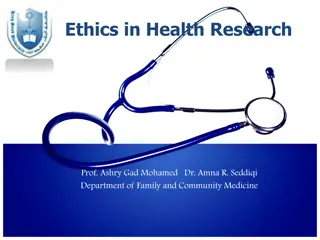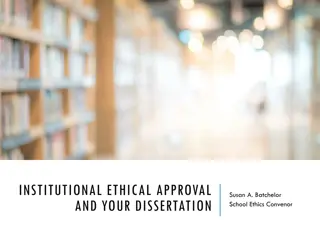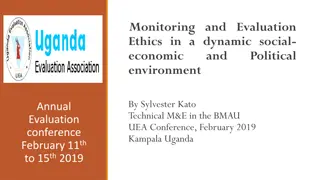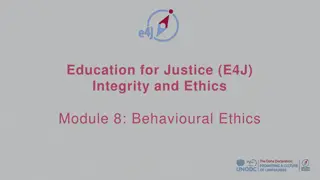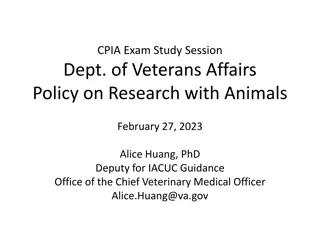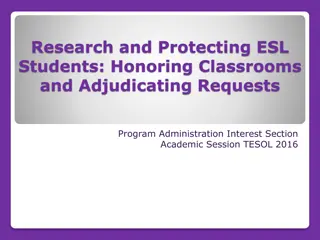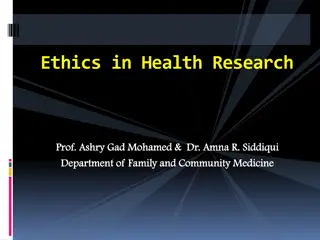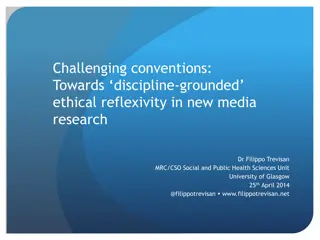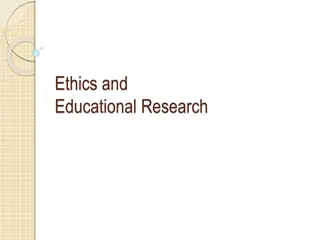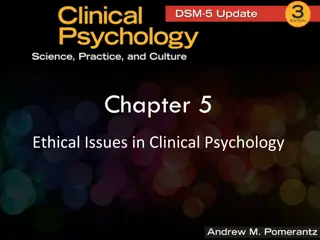Ensuring Ethical Research Practices
Ethical research practices encompass freedom, responsibility, and universality in science, including equitable access to data, respect for human and animal subjects, and adherence to regulatory systems. Challenges in publishing and measures for improvement are also discussed, highlighting the need for enhanced peer-review processes and encouragement of negative-results publications.
Download Presentation

Please find below an Image/Link to download the presentation.
The content on the website is provided AS IS for your information and personal use only. It may not be sold, licensed, or shared on other websites without obtaining consent from the author.If you encounter any issues during the download, it is possible that the publisher has removed the file from their server.
You are allowed to download the files provided on this website for personal or commercial use, subject to the condition that they are used lawfully. All files are the property of their respective owners.
The content on the website is provided AS IS for your information and personal use only. It may not be sold, licensed, or shared on other websites without obtaining consent from the author.
E N D
Presentation Transcript
Freedom, responsibility and universality if science Freedom of movement, association, expression and communication for scientists Equitable access to data, information and research materials Responsibility for the research practice with honesty and integrity, methods and result reported accurate, orderly, timely and open. Impartial and fair in assessing other works Respectful and considerate to human subjects and animals as well as environmental impact
Good research practice Regulatory systems for scientists: Laws, statutes, ordinances Authorities regulations an ddirectives General consel Conventions Guidlines Declarations, resolutions and statements Recomendations, opinions and statements Ethics codes
Biologic research with animals Use laboratory animals? Ethic problem: are animals ethical objects that needs protection in a moral sense? Are animals right-holders? Intrinsic value vs instrumental value Evaluations and comparsions between benefits for humans and distress for the laboratory animals
Publishing: Issues, false good measures &... good measures! What goes wrong in the publishing system today? Publish or perish publishing means: good scientific thought, job security, self-esteem etc... Fashion science: Things that are easier to publish than others, no matter the quality of the work. We have no power on the peer-reviewers. Fight between personal interests and Science sake: Publish/Truth! Build our thinking so that it would confirm our hypothesis or our results: no-logic!! New ideas favored over confirmation and truth Nosek, Spies & Motyl, Psychological Science, 2012
The measures that are taken are unsifficient What are they? Why is that? Conceptual replication: Interesting but cannot stand for a replication per se. Self-correction: some evidence may one day infirm our hypothesis. But while nothing comes, our false- results may influence science... And when the truth comes out? Negative-results journals: nobody want to publish there! Ask journals to encourage negative-results: They prefer clean results, if you don't have, try next door Peer-reviewing taking more care for false-results: they probably do. But: cannot see everything, and don't have access to everything! Nosek, Spies & Motyl, Psychological Science, 2012
Right measures to make science more correct? What do the authors suggest? Paradigm-driven studies Challenging mindsets Identify what we should replicate Crowd-funded replication efforts Journals focused on the logic Lower publication barriers Open data, open methods, open tools What else could we think of? Personal insights: What about making consortia? Several labs together May be we shall all take statistics courses! Nosek, Spies & Motyl, Psychological Science, 2012
Charlantanry in fornsic speech science Voice stress analyzer (VSA) Layered voice analyzer (LVA) Applies 8000 mathematical algorithms on 129 voice frequencies Microtremor detection in speech signal Frequency of 10Hz in muscles on relxation 500 lines of Visual Basic code in the patent VSA measures microtremor in 20-40hz No explanation on why certain values are correlated to emotional stress level Analysis is done the same way for human speech as for car engine recording
Financial and ethical effects based on usage of lie detectors Bogus Pipeline Effect Subject will answer more honestly if truth can be tested for accuracy. Police departments Insurance companies Security agencies 14% vs 40% when lie detector was used. Information about use of VSA is important, actual use is irrelevant. 16.000.000USD Should we accept that the insurance companies increase their profits by lying to their customers? Is the use of lies acceptable if it makes a suspect confess? Do we want councils to bring down social benefit costs by lying to their clients? Do we want security systems in our airports that are based on decisions no more valid than throwing a pair of dice? All lies? Scientists threatened with legal action over lie detector article Francisco Lacerda, a professor of phonetics at Stockholm University, is one of two scientists threatened with legal action after the publication of a scientific article condemning the use of lie detectors. The Israeli company Nemesysco, which manufactures detectors, has written in a letter to the researchers' publishers that the researchers may be sued for libel if they continue to write on this subject in the future.
Trouble in the lab Only 6 out of 53 landmark studies in cancer research could be replicated - Amgen Bater Healthcare replicated successfully 25% of 67 seminal studies Statistical mistakes are widespread Low statistical power in neuroscience, typically 0.21 Marjan Bakker PLoS ONE and Science Exchange Reproducibility Initiative scientists can pay to have their work validated by an independent lab There is no cost to getting things wrong The cost is not getting them published Brian Nosek 18-point checklist introduced by Nature Negative results published 1990 30% and 14% in 2007 Budding scientists must be taught technical skills, including statistics, and must be imbued with skepticism towards their own results and those of others. Errorous paper about cancer research was accepted in 157 of 304 per reviwed papers - John Bohannon Researchers ought to be judged on the basis of the quality, not the quantity, of their work. Melissa Haendel found > 50% of biomedical papers failed to identify all the resources necessary to reproduce the results. need to develop a value system where simply moving on from one s mistakes without publicly acknowledging them severely damages, rather than protects, a scientific reputation.
